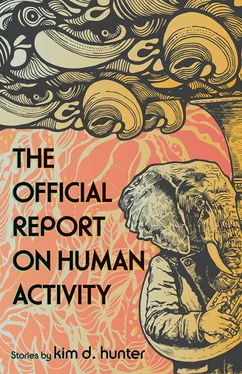The man was friendly enough, but did not speak English. Nat didn’t even know what language the man spoke. Nonetheless, it was clear that he wanted to be friends. So he and Nat found a corner and began to try to play together, which was much easier than talking. Nat learned the instrument was called a kora. When Nat asked the Warden if he and the man with the kora could play together for one of the audiences, the Warden simply smiled slowly without opening his mouth. Nat never saw the man with the kora again.
After a few days, Nat was plagued with nightmares about the kora player in the water room with the screen in the ceiling shooting bolts. The water rose and did not recede.
Nat took on more and more of what he discerned were night performances. He had little sense of day or night. But he realized the nightmares were fewer if he just took catnaps in the common area.
The Warden had Nat playing more and more often. The audiences varied in size but they always wore extraordinarily refined clothing. He was usually close enough to see diamonds or gold in their discrete piercings, close enough to see what could only be the finest animal furs woven into their garments, close enough to hear conversations before the show about exclusive travel arrangements or live performances featuring people that the masses could only see via hologram if they were lucky.
Try as they might, no matter how grand the room, the technicians assigned to it could not completely block the rumble of thunder. So the topic of conversations that most intrigued and worried Nat was the one he heard the least. He gathered there was a huge storm either coming to the area, or already there, or perhaps a nearly continuous series of storms. He didn’t need to overhear conversations to know who would be dying by the boatload as a result of the storms. All he could do was worry and hope for the people he knew.
While some members of his audience were more knowledgeable about the music than Nat, many seemed content with the prestige of the event. They were the ones who simply wanted him to play louder and faster to distract them from the rumble. One even brought in a freestanding unit to amplify Nat and the guitar. That person was removed when the Warden discovered it.
One fateful performance, there were some very somber looking women in the front row. They all had very fine dark clothing. The only thing that announced they were in uniform was that they each had identical ear units with barely visible links to the eyes running just below their eyebrows. There were three of them, and the Leader could have been the daughter or perhaps granddaughter of the dark-skinned woman from the emporium, Nat’s teacher.
The Warden attended to these women and the Leader in particular. This was the only time Nat had heard him ask permission to sit next to anyone. The Leader’s smile showed clear indifference to the Warden’s request. During the show, she surprised Nat with a request for a song by Memphis Minnie.
I works on the levee mama both night and day
I works on the levee mama both night and day
I ain’t got nobody, keep the water away
Oh cryin’ won’t help you, prayin’ won’t do no good
Oh cryin’ won’t help you, prayin’ won’t do no good
When the levee breaks, mama, you got to lose
Nat was impressed that such a young woman knew such an old song. He smiled at her. She smiled back and grasped the hand of the woman next to her.
“She was singing that song when I met her,” the Leader said after the performance.
Nat couldn’t imagine where anyone would have been playing Memphis Minnie in public and so imagined a private setting. But why “When the Levee Breaks?” It was not the most romantic song he could imagine playing. In fact, he tried not to channel Memphis Minnie’s plaintive, hopeless resolve because it affected him so. The song of the rising water made him think of the end of the world even before he’d almost died in the room with the ceiling screen.
By the end of the show, the rumbling was too loud for Nat to be heard. The Leader and the Warden were in a corner of the room having an intense discussion. One of the few things Nat grasped from the conversation was the leader saying, “It’s that or the war.”
The next morning, Nat found himself in a rescue simulation trainer after being told he would have a great opportunity to reduce his prison time. The news of his being assigned to a rescue flight somehow made it down to the general population. There were others assigned to the mission as well. The inmates who had not been assigned to rescue mostly avoided the handful that had. Others shook their heads, smirked, and chuckled derisively at the “chosen few.”
The two hours in rescue simulation were jarring enough. At one point Nat came close to throwing up, as he was certain that the severed limb on the “floor” was real. But those two rough hours weren’t nearly enough to prepare him or anyone for the actual flight.
The open sky with storm would have been a fearful sight from the ground. But to be thrust directly into it after many days of incarceration was bloodcurdling. The co-pilot “trainer” wasn’t much help, as he was almost as frightened as Nat and thus barely communicative.
It was hard to believe the storm was “on it’s last leg” as the co-pilot said. The rain was relentless, horizontal. The wiper shields kept the windows clear, but that almost made things worse, as they had a very clear view of just how bad things were. Nat was certain two gray-black masses of swirling air to the east and west were tornadoes. They were filled with what could have been people or debris. The copilot broke his near silence to tell some convoluted lie about the funnels not being tornadoes. Fortunately, both of the deadly swirling masses were moving away from them.
“Don’t be looking in the distance,” the copilot admonished. “There’s gonna be people right below us. That’s why we’re here.”
With that, the copilot began tagging buildings with his scanner, marking structures with the numbers of living and dead where either were close enough to the exterior to be found, and zapping the odd stray animal in the process.
When it came time for Nat to take the controls, he was fitted with a round band that bit into his head. He couldn’t tell what it was made of, only that it sent waves of pain through his skull. He could barely keep the machine aloft even with the copilot “helping,” in part because Nat now had access to the copilot’s mental state and the amazing fear the other man tried to fight off. Controlling the craft also took a backseat to thinking about the pain from the primitive probe.
Nat’s direct mental commands did nothing to control the flying machine. But playing music in his head helped him level it off. It also helped when he tried to imagine what the Leader and the Warden had been talking about at the concert. That is what he was thinking about when the copilot disappeared, vanishing in thin air. Had the trainer not been there to begin with? If not, why had he been so frightened?
After flying alone, marking buildings, and even transporting the odd surface survivor, Nat heard the Singer.
* * *
The Scientist was desperate to hold his job. His wife the Author’s work hadn’t taken off quite yet. The Girl had yet to edit the story down to something simple, something that did not both eat and birth itself simultaneously, fascinating as the Girl thought that was.
“If you can’t make or sell widgets, you have to sell the story of widgets, not the real story with the missing and overlapping pieces, but the straight story, the story story.”
“The missing and overlapping parts are the story story.”
“Mom, please, you know what I mean!”
Читать дальше












